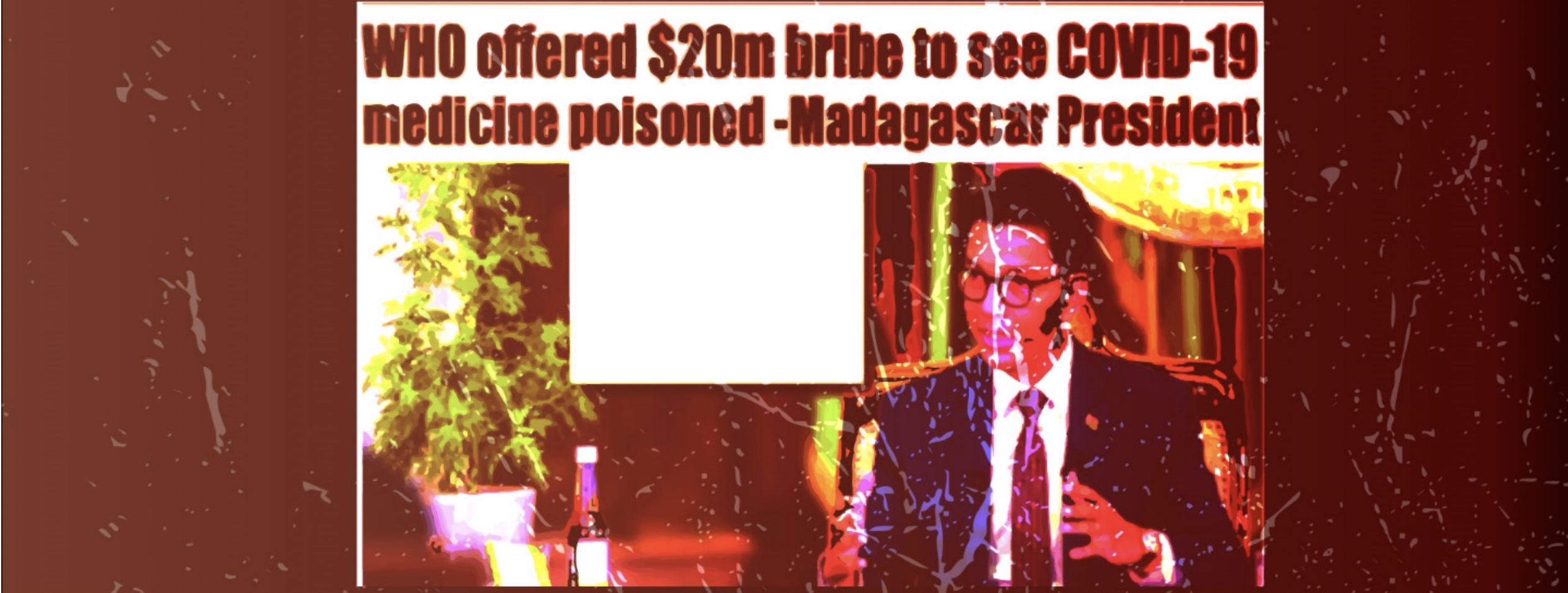
False claims accuse WHO of attempting to kill Africans by poisoning herbal remedy known as Covid-Organics

In May 2020, false information began spreading in several African countries that implied the World Health Organization (WHO) had mixed poison into “Covid-Organics,” an unproven herbal tonic touted across Africa as a cure for COVID-19, in an attempt to kill Africans. These false reports claimed that the Madagascan President, Andry Rajoelina, was offered $20 million by WHO to poison supplies of the tonic, which was created by the Malagasy Institute of Applied Research and has been endorsed by Rajoelina as COVID-19 cure. The narratives contributed to a conspiracy ecosystem of anti-vaxxers who frequently attack global public health efforts.
The false narrative gave fuel to the ongoing conspiracy fire, resonating because it targeted an international organization — in this case, WHO – that is a common target for conspiracies. The DFRLab has previously reported on the targeting of tech mogul Bill Gates by anti-vaxxers, which resulted in his name trending on Twitter in South Africa. Misinformation about vaccinations is not new, and vaccine hesitancy is one of the top health problems on the African continent, according to the Council on Foreign Relations’ Think Global Health website.
WHO has not endorsed Covid-Organics as effective against COVID-19. President Rajoelina, in a tweet, stated that WHO “will sign a confidentiality clause on the formulation of the #CovidOrganics and will support the clinical observation process.” WHO has made no official statements on the president’s claims about a confidentiality clause, though the organization is working with research institutes to select traditional medicines to be tested for COVID-19 treatments. The Twitter account of WHO African Region also posted a tweet saying the organization supported Madagascar and other African countries in their search for evidence of traditional medicines as possible COVID-19 treatments.
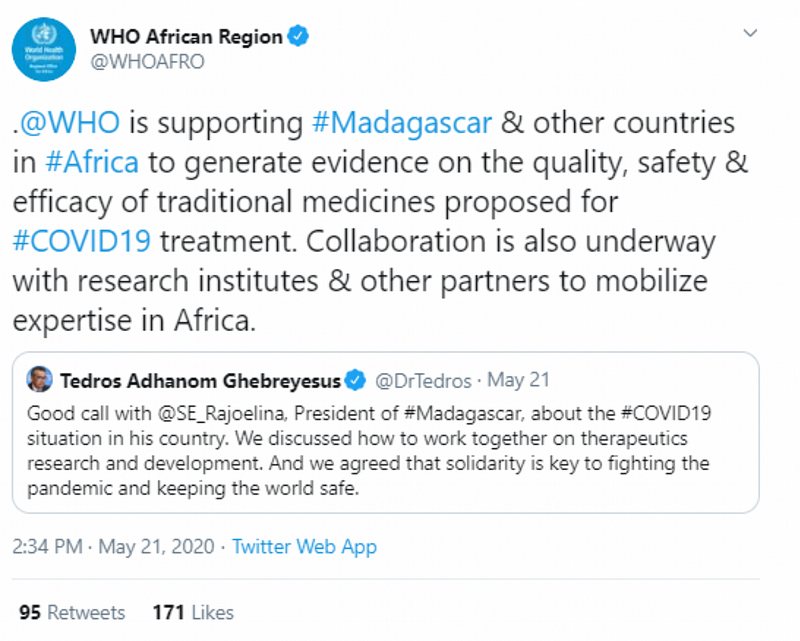
From online to print
A scan conducted using the social media monitoring tool CrowdTangle showed that the false claim appeared in more than a hundred posts and generated about 30,000 interactions across Facebook.

According to a search on the monitoring tool BuzzSumo, multiple websites carried the story with no verification of the claims.

Outlets that carried the false narrative received 21,957 engagements on social media.

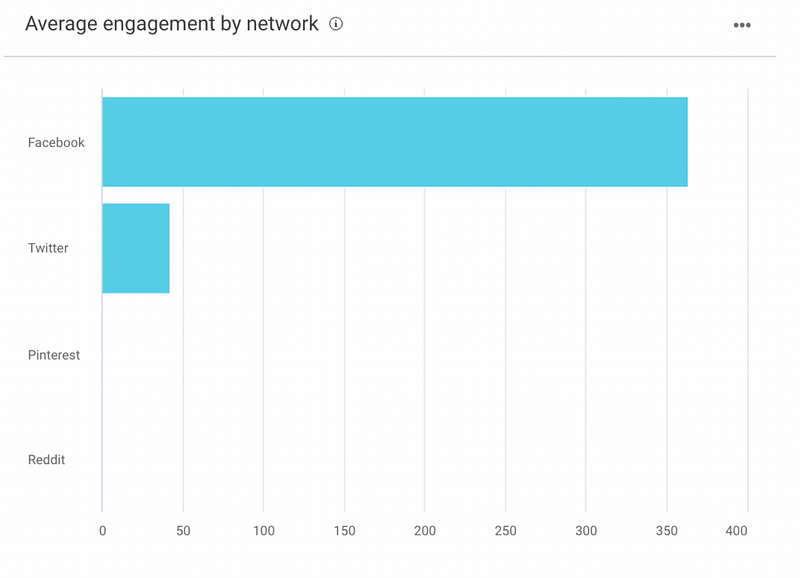
Iterations of the story were first posted online just days after Rajoelina announced Madagascar’s alleged miracle cure to the public on April 20. Three days later, a Facebook page operating out of the Democratic Republic of Congo posted a story in French that claimed WHO and “Europeans” offered Rajoelina $20 million to poison his newly released cure. The post, which has since been suspended, claimed that Europeans had copied and recreated the Madagascan remedy, including poisons that would only kill Africans.

The post told Africans to not take a vaccine created by Europeans and encouraged the continent to only use the organic medicine created and sold by Madagascar. The post was shared over 24,000 times, primarily by user accounts, pages, and groups located in Africa.
On May 11, Rajoelina was interviewed by France24 and Radio France International about Covid-Organics. Although the president claimed that the WHO’s skepticism of Covid-Organics may have racial undertones and a reflection of bias against Madagascar for being a poor country, he did not claim that an organization of “Europeans” had offered him $20 million to poison the herbal remedy.
Despite this, it appears Rajoelina’s interview was taken out of context and used as evidence of the original April 23 claim. The interview was frequently referenced in stories claiming the president had been offered a bribe to poison the alleged cure.
On May 14, the conspiracy moved from social media to print media when two local Tanzanian papers published the story. Tanzania Perspective, an English-language paper, and Fahari Yetu, a Kiswahili publication, both claimed WHO and Western/ European powers were trying to poison the African population. Appearing in print media can significantly entrench a conspiracy theory: while digital platforms have several content moderation levers available to control a conspiracy’s spread, print publishers have few options available they have distributed a story on paper.
The Tanzania Perspective story was quoted extensively online, likely because it was written in English. A photograph of the front page of the paper, with the headline “WHO offered $20m bribe to see COVID-19 medicine poisoned — Madagascar President” was widely shared on Facebook.
Both Tanzania Perspective and Fahari Yetu are owned by Tanzanite Media. Although Tanzanite Media’s digital archives of printed papers is not up-to-date, the DFRLab was able to corroborate the photographs of the Tanzania Perspective using M-Paper, a newspaper app.
According to AFP, Tanzania Perspective has published false information in the past. On April 14, the paper published a story claiming the World Bank had praised Tanzania’s anti-COVID-19 policy. The same day, the World Bank issued a statement alleging the claim was false.

The story lives on
Despite being fact-checked by multiple organizations, including Africa Check and the AFP, the claim that Rajoelina was offered $20 million to poison Covid-Organics has continued to thrive. On May 13, a day before the newspaper articles were published, a post by a Facebook page located in the Democratic Republic of Congo included China in the narrative. The post, which was shared over 37,000 times, claimed that China and the United States were the real enemies of Africa, and had offered Rajoelina millions to poison Covid-Organics. The post went on to claim that Bill Gates had contributed to the spread of the pandemic. It was subsequently debunked by AFP two days later.
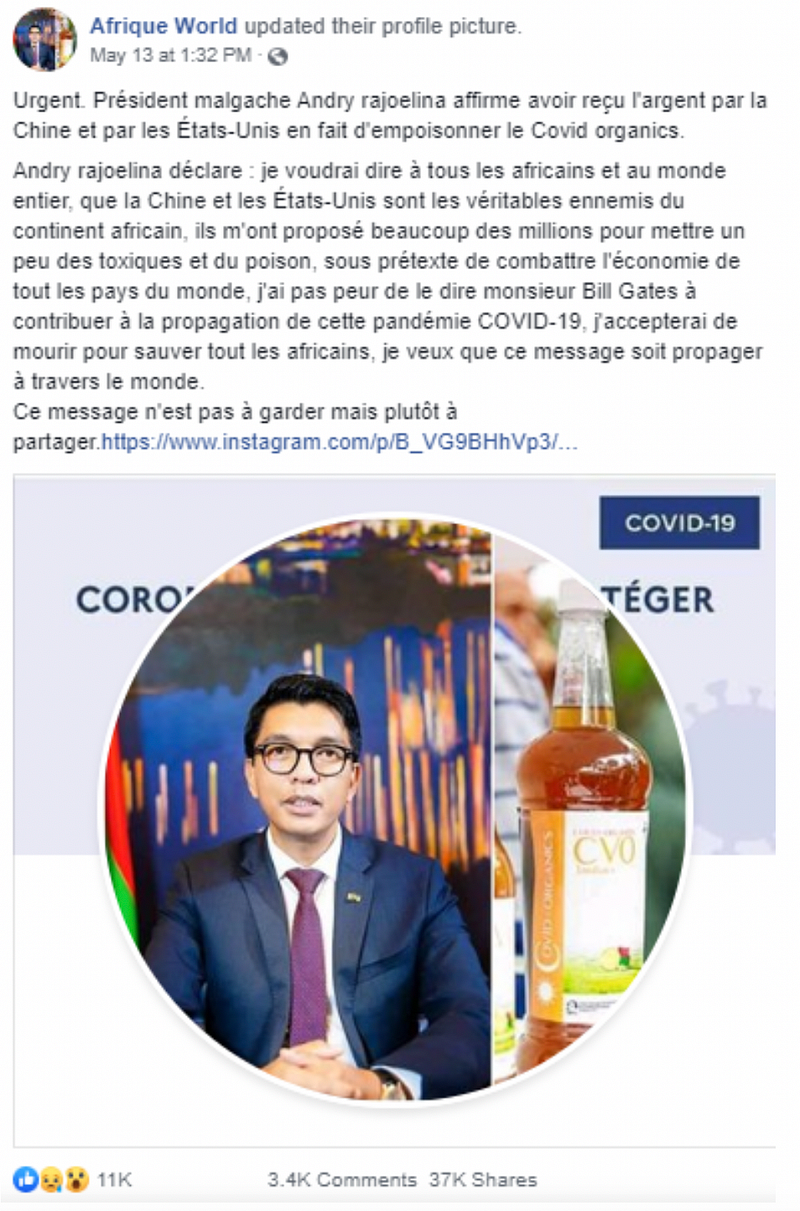
On May 15, the day after the newspaper articles were published, a WordPress blog posted what appears to be a summarized version of the Facebook post from April 23. According to CrowdTangle data, the post was shared nearly 15,500 times on Facebook, with a total of over 50,000 engagements. It was primarily spread among conspiracy and anti-vaxxer groups, often included in posts promoting the controversial COVID-19 treatment chloroquine.

A day later, on May 16, the narrative made its way to India via the known disinformation site Great Game India. The website used the narrative to push its anti-vaccination agenda, including claims that Bill Gates had bribed Nigerian officials to forcefully vaccinate citizens against the coronavirus, in its story about Rajoelina and Covid-Organics. Similarly, on May 17, Daily Post Nigeria published an article claiming Rajoelina had been offered a bribe to poison Covid-Organics. The article was shared almost 40 000 times on Facebook, with a total of over 150,000 engagements. The post also included a screen capture of the Tanzania Perspective article.
Anti-West and anti-vaccine narratives
Online chatter about the allegation that Rajoelina was asked to poison the herbal remedy appears to suggest that the World Health Organization, and by extension Western powers, do not want African countries to be self-reliant or find a cure for COVID-19 without Western involvement. In the interview with France24, President Rajoelina himself claimed that if the alleged remedy had been discovered by a European country, people would not doubt its efficacy.
In a post by Facebook page “Browns- Liberté.,” which has repeatedly published false information about COVID-19, the page claimed that WHO was complicit with the West, and that Africans should be vigilant against any WHO-endorsed remedies. The post’s comments were divided between users claiming it was false, and users saying not to trust WHO and the West. Many comments revealed that users took pride in the cure being uniquely African and believed those in power should not accept financial support from the West.
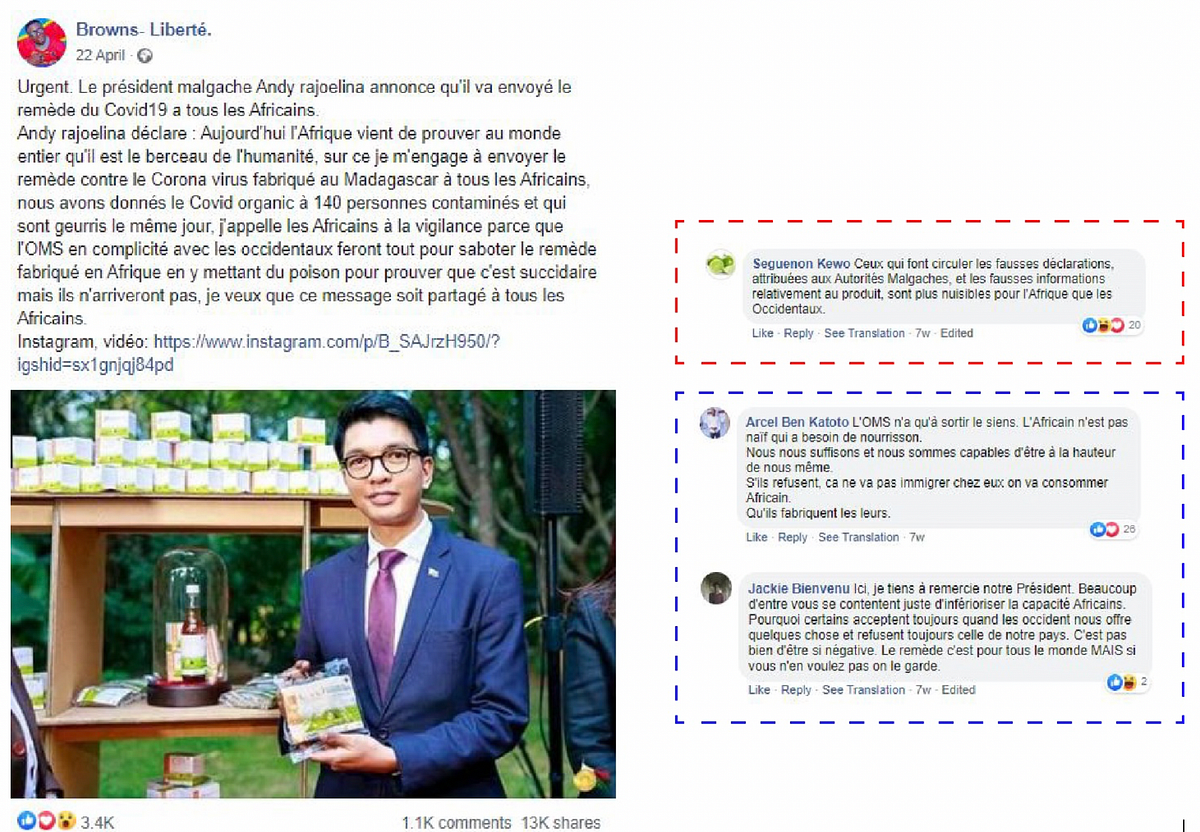
Covid-Organics has been included in a number of disinformation posts used to encourage hostility towards WHO. The “Browns- Liberté.” page claimed that WHO wanted to kill Dr. Jerome Munyangi, the man credited with creating Covid-Organics, in 2009 for speaking out against the organization’s use of malaria drugs. In another post, the page claimed that Russian President Vladimir Putin told Africans not to follow WHO advice. (The post was further shared to a group administered in Chad and by a profile from Comoros, before being ultimately debunked by AFP). Another page, named “V É R I T É,” used an old picture of French President Emmanuel Macron and Rajoelina to amplify the narrative that France supported the organic remedy and believed WHO leaders were incompetent.

On April 27, a politician from the Democratic Republic of Congo, Honoré Mvala, posted an image that stated Madagascar had not had a new COVID-19 case in 48 hours. In the image’s caption, Mvula, who has promoted Covid-Organics, said it was the type of news that gave WHO and pharmaceutical companies insomnia.
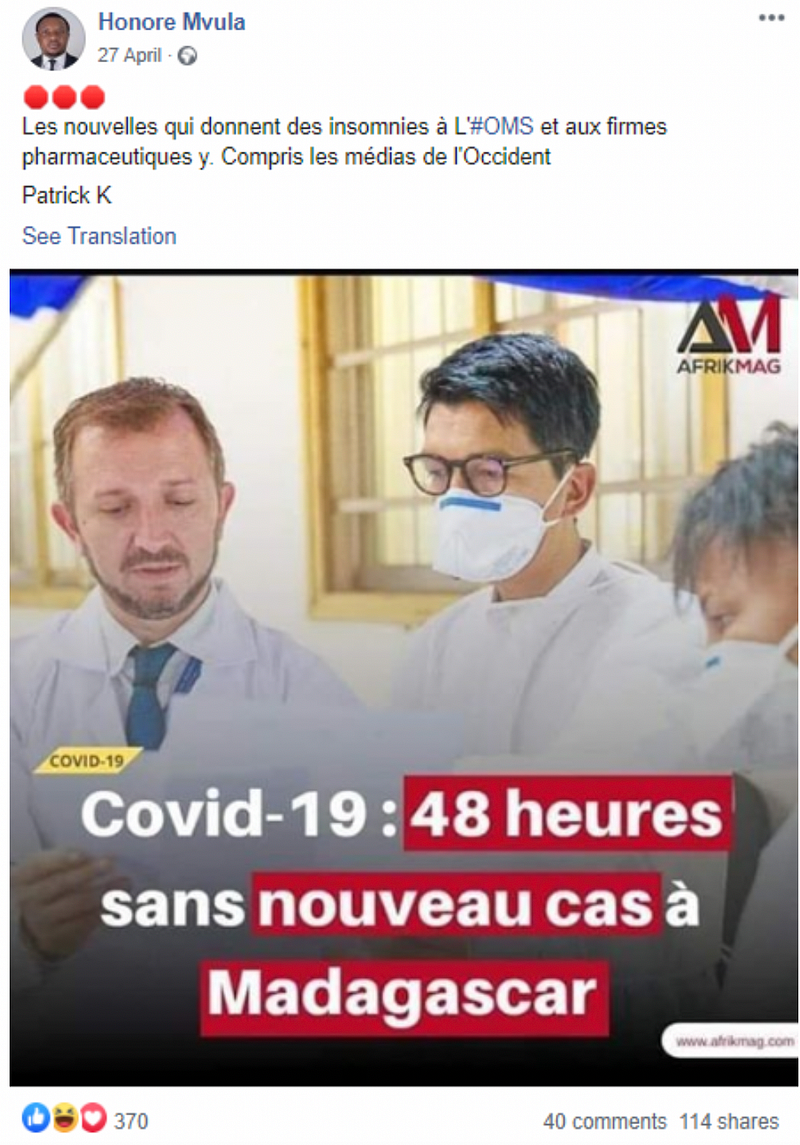
Ultimately, the notion that WHO is a Western puppet intent on destroying African countries has dire public health consequences. On May 14, ahead of the country’s elections, Burundi formally expelled WHO officials. A month later, the country was reeling from the news that President Pierre Nkurunziza, who had not taken the coronavirus threat seriously, had likely died from complications relating to COVID-19.
Meanwhile, the Tanzanian Perspective also promoted the use of the controversial drug chloroquine on its front page. In a Facebook post that circulated in anti-vaxx groups and pages, Madagascar was praised for calling out WHO’s alleged shady dealings while claiming that the key ingredient in Covid-Organics, artemisia, contains a natural form of “Cloroquin” (sic), implying the reason the drug was working in Madagascar was because it contained extracts used in the drug.
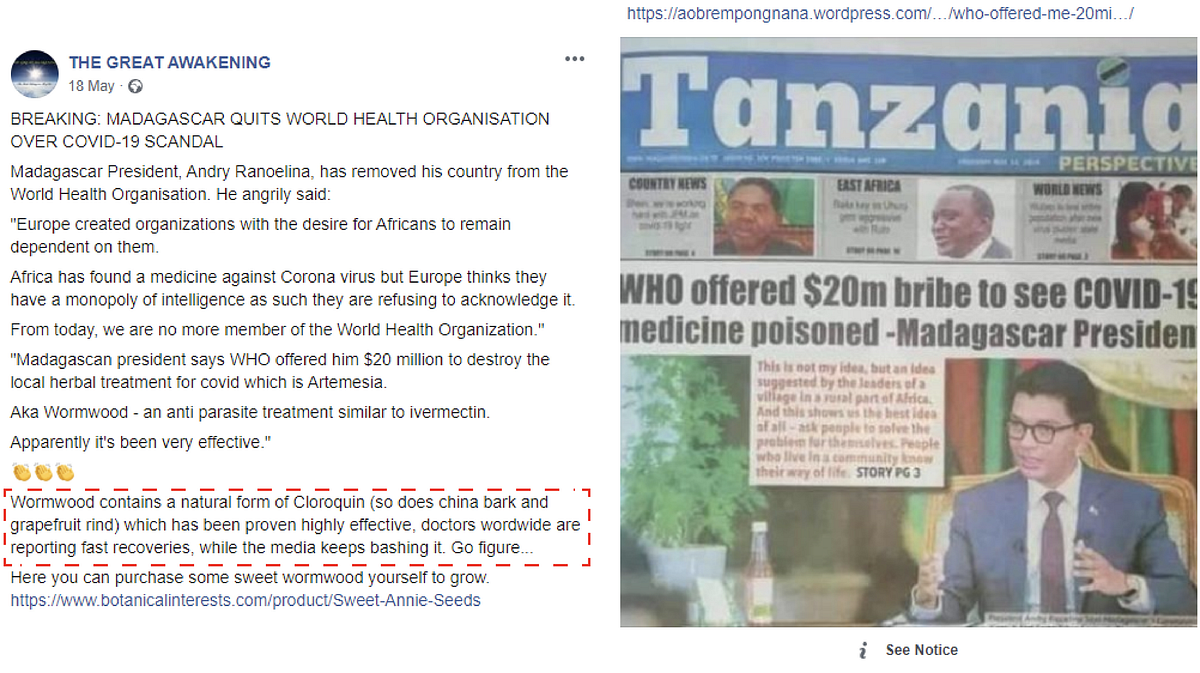
Some social media users implied that the reason that Covid-Organics has not been picked up by pharmacies and drug companies was because it would not make “big pharma” any money since it was plant-based.

Others referred to Bill Gates, amplifying the pre-existing narrative that the tech billionaire had already created a coronavirus vaccine or wanted to make money off of a cure.

As the medical research community conducts testing and clinical trials for numerous possible COVID-19, the existing misinformation ecosystem around vaccines in general has intensified the “vaccines-as-poison” narratives. The example of Covid-Organics as a potential cure — and subsequent false claims suggesting WHO wants to use it to poison Africans — is yet another case of how complicated the competition for medically accurate COVID-19 information has become.
Tessa Knight is a Research Assistant, Southern Africa, with the Digital Forensic Research Lab.The DFRLab team in Cape Town works in partnership with Code for Africa.
Kanishk Karan is a Research Associate with the Digital Forensic Research Lab.

